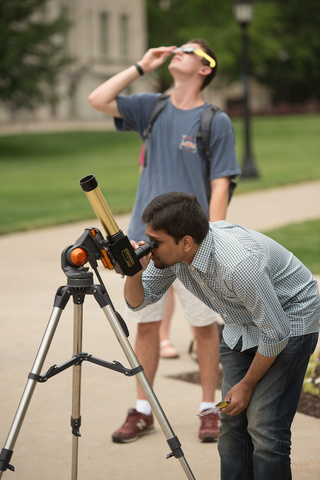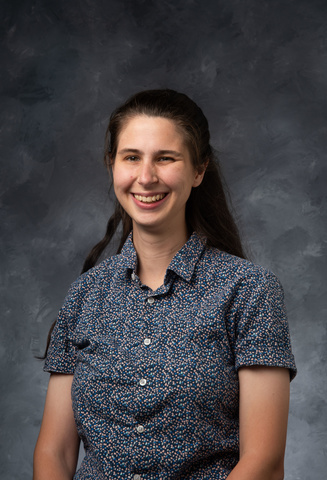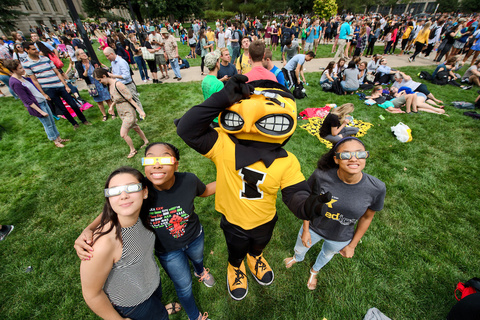By Charlotte Brookins
Seven years after the 2017 eclipse, Iowa City will experience another large-scale solar event when the moon partially covers the sun on April 8, 2024. From 12:46 p.m. to 3:16 p.m., the eclipse will progress up to 89 percent totality, dimming the skies and creating an unforgettable celestial event for all to enjoy.

Solar eclipses are rare, making it more special that Iowa City residents have had two chances to experience them in the past seven years. According to physics and astronomy professor Jasper Halekas, solar eclipses are serendipitous in nature.
"It's a happy accident that the moon happens to be at exactly the right distance and the right size to basically totally block out the sun but just leave a little bit of light around the edge of it," says Halekas in an interview with the Iowa City Press-Citizen. "You can often see a tiny little bit of light from the outer reaches of the sun still showing from the edge. It is quite spectacular. It feels like night for a few minutes; you start to hear crickets chirping, and all the local wildlife thinks it's suddenly nighttime."
Iowa City is in a section of the United States that will see the eclipse reach near-totality, an event that will not occur again in the continental United States for another 20 years.
To celebrate, the Department of Physics and Astronomy, housed in the College of Liberal Arts and Sciences, and the University of Iowa Sciences Library are hosting a viewing event on the Pentacrest and in the Sciences Library Courtyard from 12:30 p.m. to 3 p.m. on the day of the eclipse, April 8.
“We’ll be giving out eclipse glasses for people to wear to safely look at the sun, there will be solar telescopes people can look through, and if you come at around 2 p.m., you’ll be able to see the maximum eclipse,” says Caroline Roberts, coordinator of the astronomy labs and manager of Van Allen Observatory.

Roughly a week prior to the event, on Tuesday, April 2 at 5 p.m. over Zoom, physics and astronomy will share information about the sun and how it transfers energy to the Earth, as well as the process of solar eclipses and tips for safe viewing. The online event is hosted by the University of Iowa Center for Advancement.
Roberts says the physics and astronomy department and the Sciences Library are both thrilled for the events’ potential to attract further interest in their fields from students, faculty, alumni and the greater Iowa City community.
“We’re very excited about the eclipse because it allows people to see this incredible phenomenon easily and get excited about astronomy,” Roberts adds.
Roberts encourages those interested in this event and the field of astronomy to become more involved in the department on campus.
“We always encourage people to come to our events, like our regular public observing nights at the Van Allen Observatory,” says Roberts. “Any undergraduate student is welcome to take classes in the department. We welcome any interested students to explore the majors, attend Society of Physics Students meetings, and get involved in any way they can.”
The Sciences Library and the Department of Physics and Astronomy are looking forward to the events and welcome all who are interested in attending. Those interested in getting a pair of solar eclipse glasses can grab some for free while supplies last on the Pentacrest and in the Sciences Library Courtyard on the day of the event.
